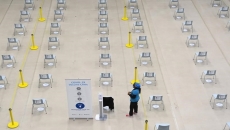Ottawa has committed more than $40 million to fund the development of geothermal power from a diminishing natural gas field in northern British Columbia.
"It will serve as a model for other geothermal facilities across the country, particularly in the North and rural communities," Natural Resources Minister Seamus O'Reagan said Friday.
The money
@SeamusORegan What an exciting time for #GeothermalEnergy in Canada, with today’s announcement of $40.5M in federal investments for the Clarke Lake Geothermal Development Project. A big congratulations to the leaders of this wholly owned and Indigenous-led project!
— Energy Futures Lab (@LabEnergy) March 12, 2021
The money will be spent on the Clarke Lake field near the community of Fort Nelson, which is nearing depletion after nearly 60 years of production. That, combined with low natural gas prices, have reduced investment and employment from the resource.
The first full size geothermal well will be drilled early this year and commercial operation is expected by late 2024. The project is expected to generate up to 15 megawatts of green energy, which is enough to power up to 14,000 households and reduce greenhouse gas emissions by 25,000 tonnes.
The project is entirely owned by the Fort Nelson First Nation, with involvement from the Saulteau First Nation. Fort Nelson Chief Sharleen Gale said the project will use the skills local workers already have, redirecting them from fossil fuels to geothermal.
"We are accomplishing all of this by using existing skill sets," she said. "This is a fast-forward for us to lead the energy transition."
A government press release said the Clarke Lake project will be one of Canada's first commercially viable geothermal electricity production facilities.
O'Reagan said Ottawa is also involved in other geothermal projects.
It has invested more than $25 million in a five-megawatt geothermal power plant near Estevan, Sask., and about the same for a similar facility near Grande Prairie, Alta.
It has also spent nearly $7 million for a project in Alberta near Rocky Mountain House and about $5 million for another one near Swan Hills.
"It's a great opportunity," said O'Reagan.
"It provides almost a safe harbour for a lot of workers who are currently displaced by the ups and downs of the oil and natural gas industries. Their skills in drilling and exploration are almost perfectly transferable to geothermal."






